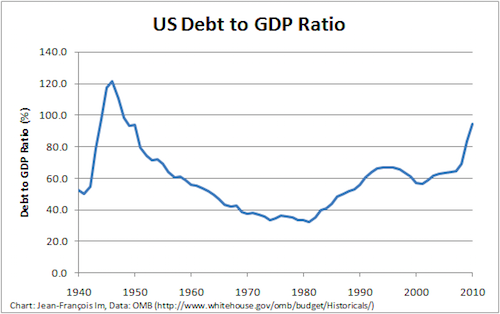A Simple Model Of Why Congress Can't Pass A Budget Deal
Representative Jim Cooper of Tennessee has a lead article in the Boston Review on the subject of institutional reform to congress that anchors a larger "fixing congress" package that's worth your time. Representative Cooper's article raises a number of issues, but it's clear that the core issue to him is that congress is "broken" in the sense that it can't agree to a budget that's balanced over the long term or even one that features a stable debt:GDP ratio.
In that sense it's a little bit odd that he cites the congresses of the 1980s as more functional than the current one, since it's plain that the eighties are when the problem arose:

But more broadly, I think it's quite simple to explain why congress can't—and won't—solve this issue. First ask: Would a debt deal accomplish anything useful in the short-term? Many people think that it wouldn't. And people who think that a debt deal wouldn't accomplish anything useful will naturally be reluctant to make concessions in pursuit of a goal that's not substantively important. Many other people think that a debt deal would accomplish something useful for the US economy in the short-term. Which is another way of saying that it would guarantee the re-election of incumbent President Barack Obama. Which means that Republicans who think a debt deal would have a positive impact should refuse to make concessions in pursuit of a deal, Republicans who think a debt deal wouldn't have a positive impact should also refuse to make a deal, and of course Democrats who think a debt deal wouldn't have a positive impact should also also refuse to make a deal.
Or if you prefer to think in terms of political message/optics/etc rather than economic fundamentals just consider the White House signing ceremony for a big bipartisan deal. How's Tim Pawlenty supposed to react to that? Does he say, "well, it turns out that Barack Obama is actually a visionary leader, an effective legislator, and a brilliant pragmatic compromiser who's addressing the nation's problems but you should elect me anyway?" Of course not. He needs to denounce the deal as a sellout of conservative principles. And for all the reasons that T-Paw needs to denounce the deal, so do all of T-Paw's rivals for the nomination. And since John Boehner and Mitch McConnell know that this is what will happen, they should refuse to make a deal.
People often seem to me to have an unwarranted faith that these problems can be overcome. In a comparative context, American-style political systems normally break down.


Matthew Yglesias's Blog
- Matthew Yglesias's profile
- 72 followers



